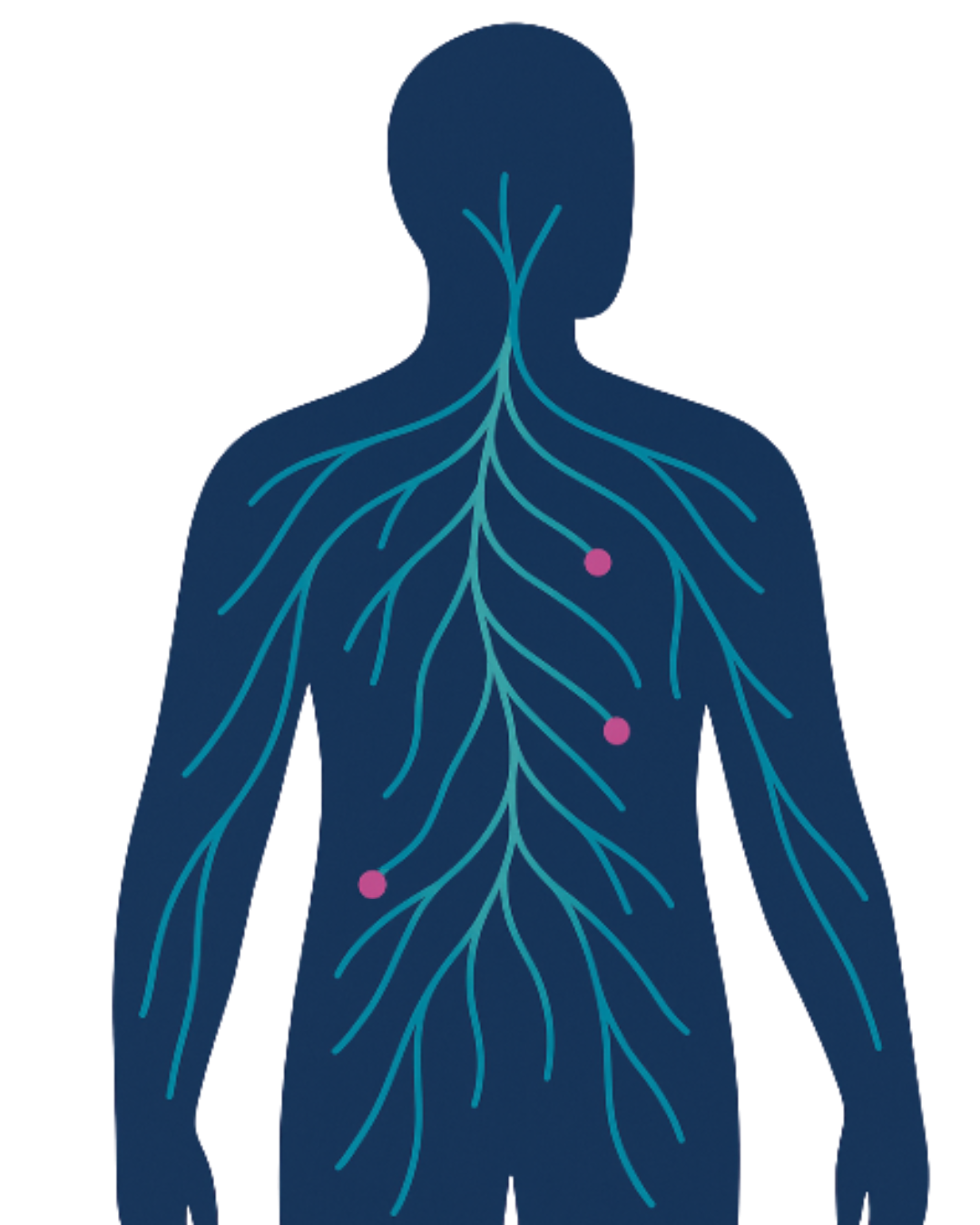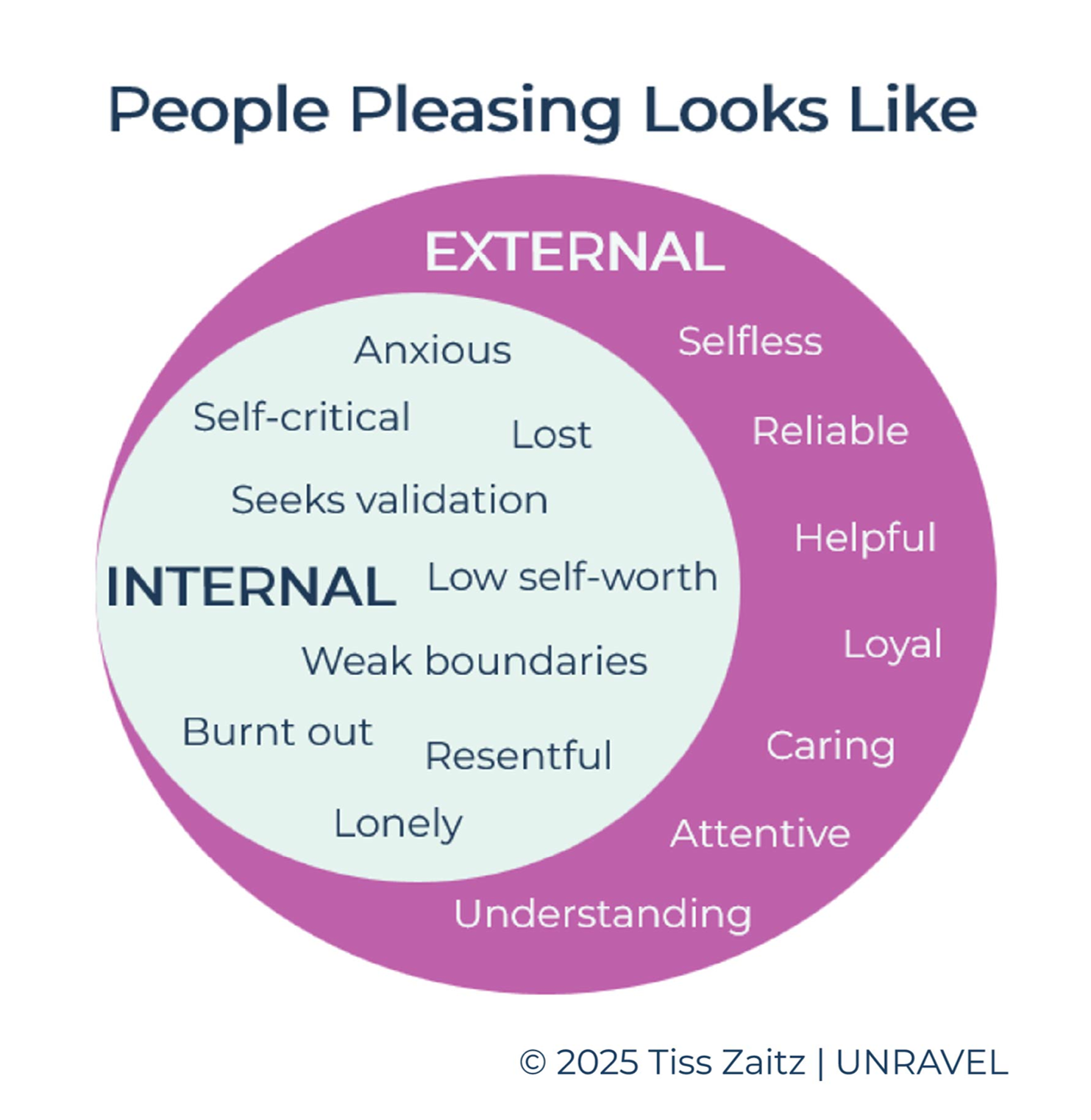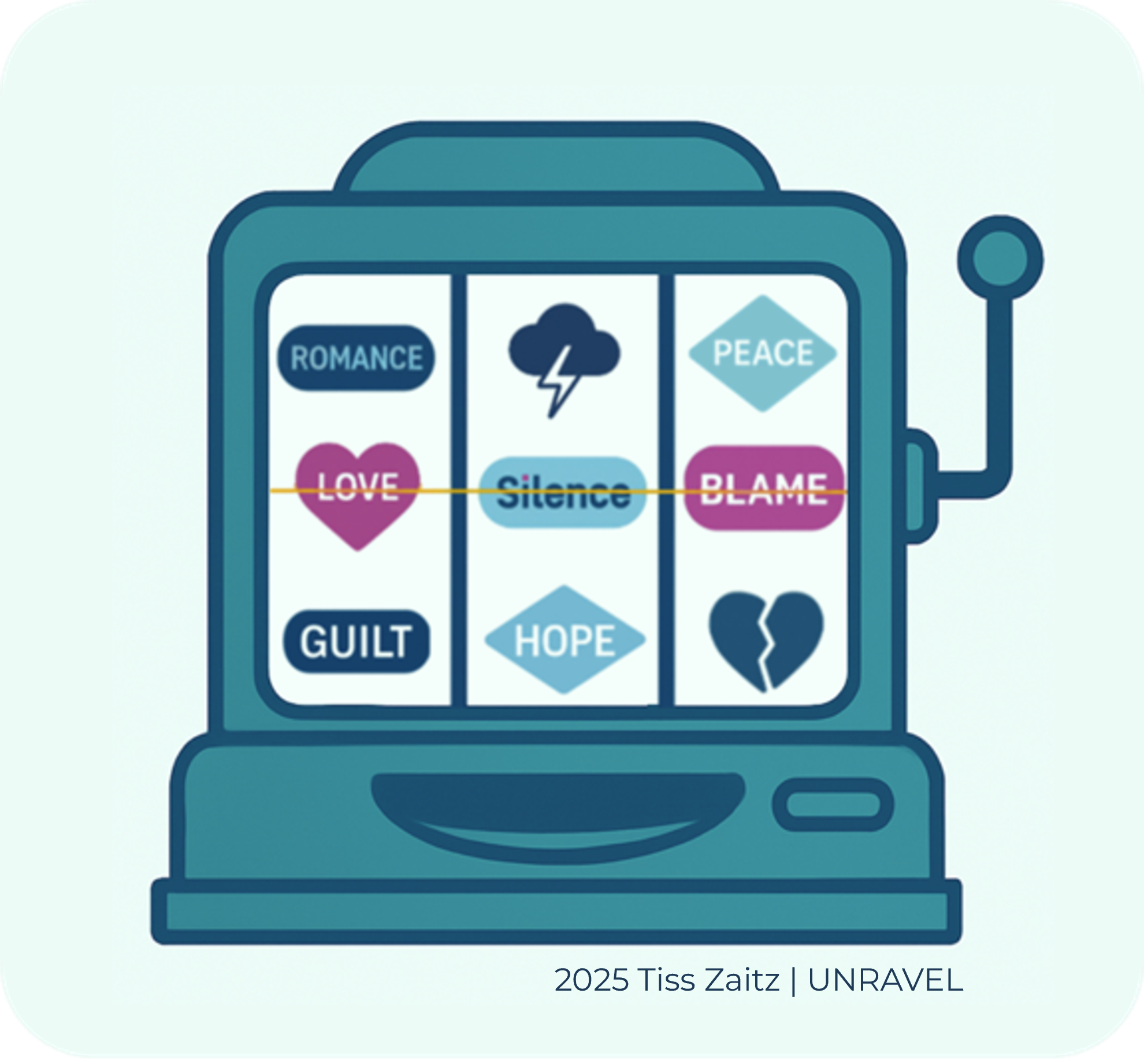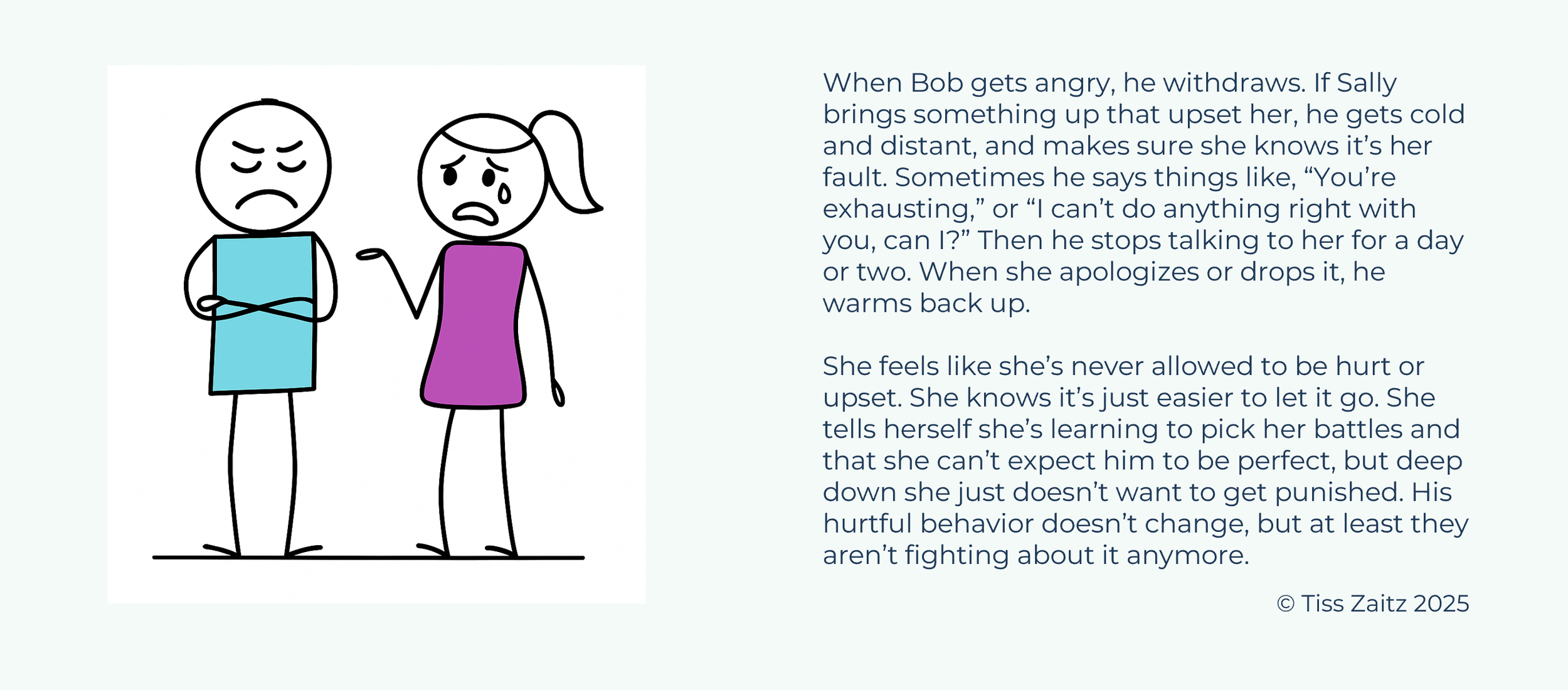
I think my relationship might be emotionally abusive or controlling.
First of all, what you’re feeling is real.
If you clicked on this path, chances are you’re feeling confused, overwhelmed, and maybe a little scared. You might be wondering: Am I making a big deal out of nothing? Is this really abuse? That’s not an accident. Emotional abuse is meant to confuse you; it’s confusing on purpose
Maybe they’ve never hit you. Maybe there are good days. Maybe everyone else thinks they’re charming or loving or harmless. That doesn’t mean what you’re feeling isn’t valid. Most abusers keep the harm behind closed doors and act generous and caring around everyone else. It adds to your confusion, and makes it harder for people to believe you when you talk about it.
This journey isn’t about labeling someone a monster or telling you what to do. It’s about getting clear on what’s happening and why it feels the way it does. Because this isn’t just in your head: Your nervous system might be stuck in survival mode. You might be hypervigilant, overly attuned to your partners emotions. You might be walking on eggshells just to get through the day. After all, your partner was so great in the beginning, you just want that person back, right?
Unfortunately, that version of your partner may have been part of the charming act they put on for everyone else. It was meant to reel you in and get you hooked, seeing them as the ideal mate, the person you’ve been searching for. Occasionally it comes back, but only long enough to give you a little relief and keep your hope alive.
Emotional abuse doesn’t always look like rage or control, it can look like hurtful sarcasm, too many eye rolls, silent treatment, subtle put-downs, or even acting like a great partner but knowing something is missing. Things like this can happen in any relationship, but when they’re part of a repetitive pattern or used to control or belittle you, it’s abuse.
You’re not imagining this. You’re not too sensitive. And you’re not alone.

But it’s really, really hard to see.
The abuser may have been calm, cool, and collected while being manipulative. There are no bruises or broken bones. Even the words themselves might seem harmless: sarcastic, subtle, offhanded, but nothing you can point to as wrong. It’s basically invisible, not just to your friends and family, but sometimes to you, too.
Emotional abuse often hides in plain sight. It begins so subtly it’s easy to dismiss—an offhand remark, a “forgotten” promise, a sarcastic joke that stings, a story that almost makes sense, a stretch of silence explained away as being busy. You may not realize it’s happening, but it’s already working, making you question yourself and wonder if you’re the problem. Because each moment seems small, you brush it off. But the impact still lands.
Over time, these moments add tiny drops of uncertainty that build into self-doubt. Eventually, you start blaming yourself, telling yourself you’re too sensitive or expecting too much. They don’t have to say it outright; their tone or body language does it for them.
One moment on its own may feel harmless, but together they do real damage. It’s like a slow leak: one drop is nothing, but over time, you get a puddle, and if you don’t notice, eventually, a flood. Zooming in on a single drop won’t explain why the whole room is underwater.
Notice how easily Bob flipped the conversation, shifting focus to Sally’s reaction and invalidating her feelings to make himself the victim. His choice of words wasn’t unintentional, they did exactly what he wanted them to. They undermined Sally, adding to her confusion, anxiety, and growing belief that she is just too sensitive. Meanwhile, he looks like the good guy who was trying to give her a compliment.
*This is called a backhanded compliment or a neg. It’s an insult that gets hidden in or disguised as a compliment so that the insult is what lands, but the compliment allows the abuser to claim innocence and blame the victim for being too sensitive.

Over time, it takes its toll
You don’t wake up one day and realize you’ve lost yourself. It happens so slowly and gradually, you don’t even notice. You edit your words to prevent an argument. You start to doubt yourself in small ways, nothing that significant. You downplay hurtful behavior or tell yourself they’re just stressed. Your body is learning what pokes the bear and what keeps the peace. It’s paying super close attention to your partner’s responses, words, and behaviors...and adapting to them.
That’s your nervous system trying to protect you. When something feels threatening, even something as little as their tone of voice, a look, or the cold shoulder, your system shifts into survival mode. You do what it takes to stay safe and keep them calm. In emotionally abusive relationships, you gradually shift towards people pleasing behaviors. You’ll do almost anything to please them, appease them, and stay on their good side.
*Note: People pleasing isn’t just ‘being too nice’ or being ‘selfless,’ it’s a trauma response. It’s about making sure people like you. It feels like caring about others, but it’s actually based in fear of saying no, setting a boundary, etc..
But the cost adds up. You start shrinking in small ways; less joy, less energy, less sleep, less you. You stop trusting your own gut. You start thinking their reactions are your fault, and if you had just said it better, softer, clearer, they wouldn’t get so upset.
When their behavior doesn’t match who you thought they were, or who they sometimes are, your brain tries to bridge the gap. That’s cognitive dissonance. The mental gymnastics you do to explain away their cruelty, justify their kindness, or make sense of why it hurts so much even though they keep saying they’re sorry.
Over time, your nervous system stops signaling danger when you’re in pain. Pain has become familiar, which your nervous system calls safe. These cycles start to feel like safer than leaving.
You still love them…but how?
This is the part that messes with your head. Your nervous system thinks it's love, so it will feel like love.
Yet you can list what they’ve done that hurts you and you know something’s not right. But there’s still an ache in your chest when they pull away. That doesn’t mean you’re broken or weak. It means you’re human.
You’re not imagining the good moments. They’re real. Maybe they make you feel seen or alive in a way no one else ever has. But in emotionally abusive relationships, those moments are often followed by blame, silence, or distance. That pattern trains your nervous system: “When I do something right, I get love. When I don’t, I get punished.” Soon you’re walking a tightrope, chasing the “good version” and trying not to fall..
This hot-and-cold cycle is called intermittent reinforcement. It’s the same thing that keeps people at slot machines. When love becomes unpredictable, your brain keeps hoping the next spin will be the jackpot. Every “good moment” strengthens the hope that this time, things will stick.
But when love turns into a reward, you start working for it, trying to earn what should be freely given
The cycle of harm and comfort actually deepens your emotional attachment. Over time, it can make leaving feel harder than staying, so hard it starts to seem like the pain of leaving would hurt more than the abuse itself.
If you grew up with inconsistency, neglect, or emotional unavailability, this pattern might even feel familiar. And we know what the nervous system thinks familiar means…safe. Sometimes, it even confuses it with love.
So if you’ve been blaming yourself for not walking away, stop. It’s not failure, weakness, or naivety. You’re not broken. You’ve been conditioned to stay. That’s what intermittent reinforcement is designed to do.

Love isn’t supposed to hurt like this.
Healthy relationships aren’t perfect, there’s conflict, missteps, and hurt feelings. But you should never feel afraid, confused, or like you’re walking on eggshells.
Confusion is a red flag. When you’re constantly unsure what you did wrong or why they’re angry, and they won’t engage respectfully or at all, that’s abuse. You’re not doing anything wrong, you’re being punished to wear you down.
Soon, guilt sets in. You start blaming yourself for being hurt or for expecting basic decency. That’s control. And over time, it erodes your sense of self until shame takes over.
Shame keeps people stuck. You begin to think you’re the problem; too sensitive, too dramatic. You doubt your memory, feelings, instincts. You don’t know how things got so bad or why trying harder only makes them angrier.
That’s because they’re not trying to fix it. They want you confused and exhausted so you’ll give in. They’re not loving you, they’re training you to comply.
You should never have to walk on eggshells or shrink yourself to keep the peace. Your needs and feelings deserve as much care as theirs.
That’s not love. That’s abuse. Period. And no matter how many times they promise, it’s unlikely to change.
Bob taught Sally that expressing hurt feelings to him will make him mad. He conditioned her to stop complaining about his bad behavior by intentionally blowing up anytime she was upset. He knows she didn’t actually do anything wrong, he’s not even angry, just annoyed. But he wants to treat her however he feels and let her bend over backwards to cater to him, without having to do much for her. And he doesn’t want to have to hear about it. So he blows up every time Sally complains. She’s learned that trying to resolve an issue only makes things worse, so she bites her tongue and cries in private.
You’re not weak…you’re human
You can’t logic your way through this, it’s about survival. When your nervous system is stuck in freeze mode, “just leaving” can feel impossible.
You might feel paralyzed. Maybe you’re terrified of being alone, or of what they’ll do if you try. Maybe you can’t afford to leave. Maybe you still hope the good version of them will come back.
None of that makes you weak. It makes you human. And leaving isn’t always the first step, seeing clearly is.
That clarity takes time. You’ll cycle through it, questioning, feeling sure, then doubting again. That’s normal, especially when others minimize it or say, “But they seem so nice.”
You don’t have to be ready to act. You just have to be willing to see what’s really happening.
That’s where unraveling begins. And you’re already doing it.

Why it’s so hard to leave
People love to say, “If it’s that bad, why don’t you just leave?” They might mean well, but it’s dismissive and a little insulting. If that comment upsets you, it should. It oversimplifies something deeply complex.
Walking away isn’t simple. If doing what we know we should do were easy, we’d all eat clean and work out every day. But our behavior is driven by emotion, not logic. Friends and family judge from the outside, without feeling what you feel.
You might be terrified of being alone, or of what they’ll do if you try to go. You might not be able to afford it, have kids, or still hope the good version of them will come back.
Your nervous system has adapted to this relationship. No matter how bad it gets, trying to leave will set off alarms, warning you of everything that could go wrong just to keep you from acting. (It’s lying, but it’s convincing.)
That’s not weakness. It’s neuroscience. It’s human. Nothing’s wrong with you for struggling to leave what others think should be easy.
Leaving is a process. You’ll cycle through certainty, doubt, nostalgia, and fear, then tell yourself not to act until you’re “100% sure.” That’s normal, especially when people around you minimize what’s happening.
But “normal” doesn’t mean good. That loop of hesitation is your nervous system’s way of keeping you in place. Knowing that doesn’t make it easy, but it might make it a little clearer, and that’s where change starts.
You don’t have to be ready to act. You’re here, and that means you know something isn’t right and you’re trying to understand. That takes courage. And it’s more than most people in abusive relationships do.
What you’re feeling is completely valid, and what you’re doing is incredibly difficult and scary. Yet here you are.
You should be proud of yourself. This is strength.

Before you go…
I sincerely hope this journey gave you something valuable: clarity, comfort, validation, maybe even a little relief from the confusion. If you’re feeling overwhelmed, raw, or unsure what comes next, that’s okay. You’re doing hard things. Really hard things.
If and when you want to keep going, UNRAVEL has more to offer. The Foundations are the building blocks, they explain the underlying mechanics of relationship behavior. The Models & Frameworks show how those mechanics create and reinforce the patterns people get stuck in.
The information is in a slightly more academic tone, as these pages take on a more educational perspective…but still in clear, relatable language. You won’t find any 7 syllable words or sciencey jargon here.
I’d also love to hear your story. If you feel like sharing, you’re more than welcome to do so here. Your experience matters.
Thank you for trusting me to guide you. I wish you a lifetime of healthier, happier relationships.
Every relationship is unique, and emotional harm doesn’t always follow the same patterns. What you’ve read here reflects common dynamics, but it’s not a diagnosis. I hope something resonated, but please know this isn’t therapy or psychological, medical, or legal advice. It’s here to offer clarity, not conclusions.






